CONVERSATIONS WITH SAI
Satyopanishad - Part 28
Direct Directions from the Divine
Dear Reader,
In response to your positive feedback to this section where we have a conversation with the Divine, we continue with Prof. Anil Kumar’s “Satyopanishad” following Dr. John Hislop’s series “Conversations with Bhagavan Sri Sathya Sai Baba” that ended in January 2008.
This series is also in the question-answer format that many devotees prefer, and has answers from Bhagavan on topics as wide ranging as the origin of evil, the goals of human life, and aspects of God embodied and formless, to price hikes, womens’ liberation, vegetarianism, and the generation gap among people of the present times.
Published in two parts by the author, these volumes have 270 questions in all, which are neatly grouped under separate chapters. In this issue, we begin chapter nine, “Scriptures and Baba – Ramayana”.
CHAPTER IX:
Scriptures and Baba - Ramayana
Prof. Anil Kumar: Swami! Kaikeyi had sent Rama to the wilderness on the eve of His installation as the crown prince. What was Rama's attitude to her? Generally, it would be one of hostility, wouldn't it?
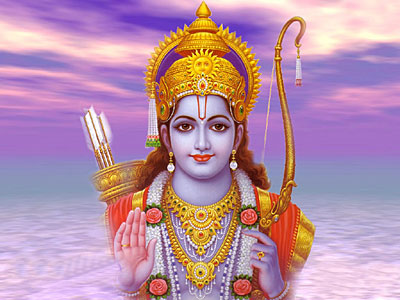 |
Bhagavan: Rama is the embodiment of Dharma, the personification of tranquility. Under no circumstance did He hate Kaikeyi. It was only after bowing down at her feet that He left for the forest accompanied by Sita and Lakshmana. Longing for the darshan of Rama, Bharata too proceeded to the forest, accompanied by feudatory kings, the army, citizens of Ayodhya, and the sages. Falling at Rama's feet, he sought to be pardoned, and prayed to Rama to return to Ayodhya and rule the Kingdom. Kaikeyi stood pitiably to one side.
Rama surveyed the gathering. Right away Rama addressed Bharata with these words: "Bharata! Has mother Kaikeyi arrived? Where is she?" Turning to her, Rama bowed at her feet. Her words, like the prelude to a great drama, had inaugurated the mission of the incarnation. Had she not expressed her desire as she did, the events of the Ramayana would not have taken place. She auspiciously initiated the work of the Divine Master Plan. Rama, indeed, knew this. Then, what scope is there for hostility and hatred?
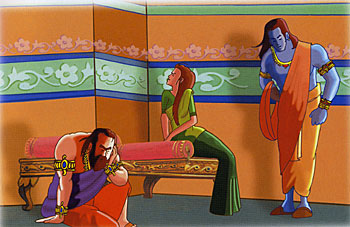 |
Moreover, in this context, Rama had to uphold another dharma as well. At the time of Kaikeyi's wedding with Dasaratha, her father, the king of Kekaya, had made known his desire: "O King Dasaratha! You have contemplated marriage with my daughter, Kaikeyi, in order to have progeny. Then, it is her son, who should become king, your successor, shouldn't he? Is this acceptable to you? If your queens Kausalya or Sumitra give birth to sons, Kaikeyi's son would lose the right to kingship, wouldn't he?" King Dasaratha listened to this wish, consulted Kausalya and Sumitra in the matter, apprised them of the implications, and won their approval.
Then, Kausalya remarked: "Swami! After you had promised that Kaikeyi's son alone would become king of Ayodhya, even if we were to conceive and give birth to sons, they would never act contrary to their father's word of honour. None assuredly would be born in our dynasty but those who accept respectfully the fulfillment of their father's wishes." Accordingly, for Sri Ramachandra, the practice of dharma and the fulfillment of his father's wishes were supreme. Therefore, Kaikeyi's wish is lawful and righteous. This was not unknown to Rama.
Prof. Anil Kumar: Swami! Is it right on the part of Rama to kill Tataka, a woman?
 |
Moreover, the mission of the incarnation of Rama awaited fulfillment. Everything has to proceed according to the Master Plan. The actions of the demons were extremely cruel. In order to wipe out this pitch of cruelty and to protect dharma, the demons had to be destroyed. Tataka may be a woman; but her actions were demonic, weren't they? Therefore, killing Tataka was just and fully in consonance with righteousness.
In this matter, whether the agents of wickedness are men or women is immaterial. What is crucial is the usefulness of their deeds. Because of his unrighteous conduct, Vali, the king of the monkeys, though a male was not spared, was he? Tara did advise Vali: "Lord! Sugriva was only a few days ago mortally wounded and fled. How come he is now brave enough to challenge you? He has the support of Rama, don't you know? Rama is, indeed, no ordinary man. Though you are very valiant, Rama is bent on assisting Sugriva and killing you, because of your unrighteous deeds. Seek refuge at Rama's feet!" Vali paid no heed to her words, and fell a prey to Rama's arrow. Thus, the primary criterion is restoration of dharma. Gender is irrelevant.
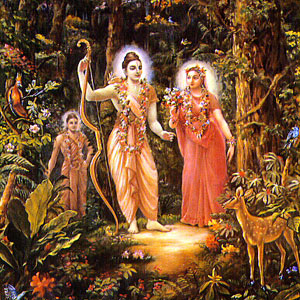 |
Prof. Anil Kumar: Swami! Pardon me and treat this question as arising from the influence of modernity. Our society regards Sita and Rama as the ideal couple. Now, kindly do not get angry, Swami, Please! What happiness was there for this couple? Only troubles, for sure! How can this be ideal matrimony?
Bhagavan: That ideal can be put in a nutshell. Not once did Sita transgress Rama's command; likewise, not once did Rama oppose Sita's wish. This is ideal matrimony. You may have in mind the abandonment of Sita on the report of a washerman's words. Is it not possible that, in the kingdom there may be others besides the washerman who entertained doubts about the chastity of the virtuous Sita? Those were the words uttered by the washerman; many others may have felt the same way. The episode of Sita's ordeal by fire serves only to proclaim her chastity to the world. Rama knows everything; He is omniscient.
Prof. Anil Kumar: Swami! Millions revere the illustrious characters in the history of Bharat (India), for these have stirred their hearts, inspired their devotion, and offered them refuge. When, taking pity on us, you explain these figures they appear so novel, and awesome. They come alive, swaying our hearts with their nobility and majesty. I have a question.
At the end of the Great War, Lakshmana proposes to Rama that they should settle down in the golden kingdom of Lanka saying, "Elder Brother! Bharata is ruling Ayodhya, let us make this charming Lanka our permanent abode!" Is Lakshmana infatuated by riches and pomp?
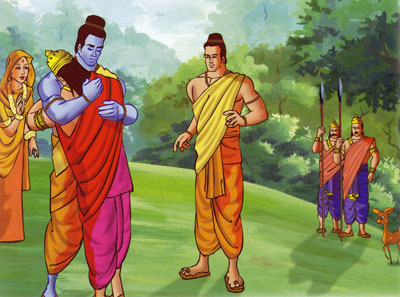 |
Bhagavan: Not at all. Kaikeyi desired that Rama should be sent to the forest. There was no need for Lakshmana to accompany him. Voluntarily Lakshmana gave up royal pleasures and luxuries, and left behind his noble wife, considering serving Rama day and night his chief duty. Therefore, Lakshmana stands as a symbol of total surrender. This proposal of Lakshmana to rule Lanka is significant for it had occasioned Rama's response which was a clear message to humanity. Rama countered Lakshmana's suggestion with these words: "Janani janmabhumis'ca svargadapi gariyasi” meaning,“Motherand motherland are greater than even Heaven". Even if your mother is ugly, does she cease to be your mother? Just because she is beautiful, does a stranger become your mother?
Lakshmana's suggestion bore fruit as Rama's vitally patriotic message to the world. Is it not Lakshmana's proposal, "Ramachandra! Now you can rule golden Lanka, can't you?" that prompted Rama to hold up an ideal for the world to emulate? It happened just this way, and not as though Lakshmana was ever infatuated by riches and luxury.
Lakshmana's devotion to Rama is unbounded. Once, Lakshmana saw at some distance from their hermitage a column of dust rising to the sky; he climbed a tree close by, and noticed far away Bharata at the head of an army with its four units ‑ infantry, cavalry, elephants, and war chariots. He said to Rama, "O elder brother! Not content with sending us to the forest, Bharata is coming even to this place contemplating harm to us and bringing along all four arms of military might." Rama gently remonstrated Lakshmana for his remarks and explained that Bharata was coming in a procession with a prayer to Rama to take back the kingdom.
 |
In this situation, you may get the impression that Lakshmana is quickly incensed. Such a conclusion is not fair. If the intention was only to pray to Rama to take back thle kingdom, could not have Bharata come alone? Why should he be accompanied by a huge army with its four arms? This is what roused Lakshmana's suspicion, and not his hasty judgement, as you may suppose. But that was not Bharata's fault either. When he set out to pray to Rama to rule Ayodhya, the rishis, the armed forces, and several leaders followed him for the darshan of Rama. Thus, Bharata is not to blame. Today, it is very necessary to appreciate rightly the characters drawn in our epics and scriptures - their motives, the wellsprings of their action, as well as their grandeur, solemnity and generosity. You should not ascribe your attitudes to those characters.
Prof. Anil Kumar: Swami! I do not know anything about Satrughna, except listing him in the names of the brothers: Rama, Lakshmana, Bharata and Satrughna. Kindly narrate to us at least one episode concerning his character.
Bhagavan: Satrughna was distinguished as much for his valour as for his righteousness. His devotion to the master was of an extraordinary order. His fraternal love was exemplary. You know well that Lakshmana's name stands next to Rama's. That is why their names are treated as a compound word, "Rama Lakshmana". Similarly, Satrughna was always by the side of Bharata such that the expression "Bharata Satrughna" gained currency. Just as Lakshmana served Rama with unswerving devotion, even so did Satrughna serve Bharata.
 |
Satrughna bore immense love for Rama. Here is an instance: Along with Bharata, Satrughna returned to Ayodhya. This incident took place when they left the kingdom of Kekaya, their maternal uncle. Learning that Kaikeyi was responsible for sending Rama to the forest and for planning Bharata's coronation, he was heart‑broken. He also came to know that it was the evil counsel of Manthara that made Kaikeyi ask Dasaratha to fulfill the two boons. Enraged, he cast a look of unbridled wrath at Manthara who happened to be passing that way. At that hour Manthara was very happy. News of the crowning of Bharata, her Queen's son, had sent her into rapturous joy. Satrughna saw her walking in all smiles, dressed in very rich finery, and sporting a variety of ornaments. Striding towards her, he gave vent to his anger by kicking Manthara in the waist. She fell down and her necklace of diamonds and pearls that scattered on the floor shone like stars in the sky. Meanwhile, Bharata arrived on the scene. He said, "Dear brother! Rama does not approve of treating women cruelly like this. Actions like yours do not, in the least, please Rama. Calm down." Such was Satrughna's love for Rama.
Prof. Anil Kumar: Swami! In the Ramayana, the role of Hanuman is very prominent. He is the best example of dasyabhakti, devotion of a loyal servant, one of the nine paths of devotion. We are so fortunate to hear from you about the devotion of Hanuman. Would you kindly tell us how modern youngsters can emulate his example?
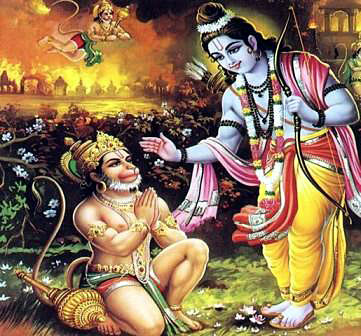 |
Bhagavan: Hanuman is known for physical strength, intelligence, perfect character and scholarship. Yet, do you know what he said when he entered the court of Ravana? While introducing himself he said, “Dasoham Kosalendrasya - Iam a servant of Rama”. The position of a servant of Rama was a matter of pride and prestige for Hanuman.
Rama asked the vanaras as to who among them could cross the ocean and go in search of Sita. One of them said that he would be able to cross 10 kilometers, another said 40 and so on but none could say that he could jump s'atayojana, 100 kilometers across the ocean.
Earlier Rama had asked Hanuman, "Can you go and successfully return after finding out where Sita is?" Then Hanuman had replied, "Yes, I will." Rama then had asked, "Hanuman, you have had no experience of jumping across a vast sea. You have never seen Sita earlier to identify her now. Then how do you say so confidently that you can cross the mighty ocean in search of Sita in Lanka, find her and then return?" Hanuman replied, "Swami! Would you not give me the needed strength, capacities and abilities to fulfill the mission you have assigned to me and then command me to fulfill it? With your blessings and invincible will; wouldn't I be able to accomplish what I am supposed to?" Such was the intensity of his devotion.
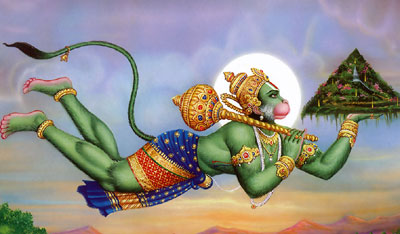 |
Youngsters should follow God's command unhesitatingly. They should never doubt, question, disobey, or criticise it. Strict obedience to the divine command is called surrender. When you develop this kind of surrender to God, you are bound to succeed.
While crossing the ocean, Hanuman displayed courage and valour par excellence due to his deep devotion to Rama. Mount Mainaka prayed to him to rest on his peak for some time on the way to Lanka. Mainaka wanted to take this opportunity in order to express his gratitude to Vayu, the wind God, father of Hanuman, who had saved him earlier. But Hanuman, politely rejected the offer, telling him that he wouldn't rest until he had completed the work assigned to him by Rama and that he would oblige Mainaka on his return from Lanka. He, thus, gave top priority to Rama's mission.
It was the confidence born out of his devotion to Lord Rama that made him cross a vast ocean. By following His command, he won the grace of Rama. Normally, a monkey is noted for its unsteady and wavering mind, but by surrendering to Rama, Hanuman's mind became absolutely steadfast, fixed firmly in devotion to his duty and that is exactly why he is worshipped today as Hanuman.
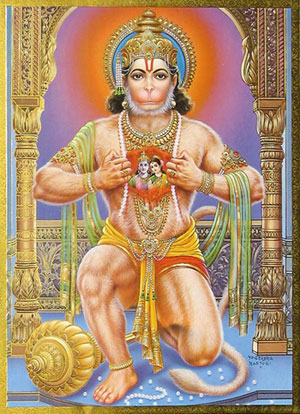 |
At the time of his coronation towards the end of the epic, Rama was distributing gifts to all His subjects. But he did not give any present to Hanuman. Then Sita softly asked, "Lord! Have you forgotten Hanuman? How is it that you have not given him any gift?" Then Rama smiling said, "Sita! It is true? I want you to present him any gift of your choice".
Then Sita gave Hanuman her own diamond necklace. But Hanuman started biting every diamond in the necklace, breaking it off, bringing it close to his ear and then dropping it on the ground. Watching this, Sita said, "Hanuman! You have not given up the habit of a monkey. What are you doing with the diamond necklace I presented to you?"
Then Hanuman said, "Mother! No doubt you have given me a most precious diamond necklace, but I want every individual diamond of the necklace to resonate with the sound of my Lord Rama's name. So, I am testing every one of the diamonds by breaking it first and then keeping it close to my ear to find if the sound of the Lord's name is heard. I am throwing them out one after another as I don't hear His name in any of these." Nothing in this universe is more precious than the sacred name of God, Rama.
The whole assembly was adjourned for the day. Rama was retiring to his bedroom and Sita was following him. Lo and behold! Hanuman too was making his way towards the bedroom. Rama then said, "Hey Hanuman! What are you doing here?" Hanuman said, "Lord! Sita is following you. So I am also coming to you." Rama said, "Anjaneya! Look! Sita has vermilion (Kumkum - the mark of marriage) on her forehead that qualifies her to get into my bedroom".
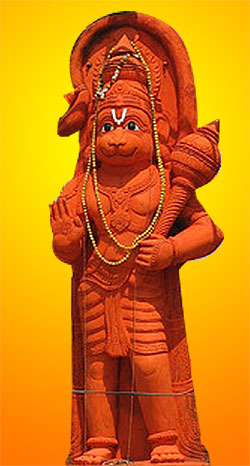 |
At this, Anjaneya left the place and returned after some time. He went round all the shops, collected all vermillion applied it all over his body and returned, and stood in front of Rama. He said, "Oh Lord! Just for the simple reason that Mother Sita has a dot of kumkum on her forehead, you qualified her to enter your bedroom. Now, please see here! I have this kumkum all over the body. What do you have to say now?" That was the standard of his devotion and the determination to be with God always.
On another occasion, the three brothers of Rama met, discussed for some time and distributed among themselves all the duties they had to do personally in attending on Lord Rama.
Hanuman noticed all this and finding that he was left out with no duties to his lord, he softly asked them, "Sir! When the lord yawns, there is a need for someone to click fingers and make a snapping sound befitting His royal status; we do not know when he would yawn, so I should be with him throughout".
So, Hanuman had to be in the company of Rama while his brothers could attend on him according to duties they had taken upon themselves at different times. Thus, Hanuman was the very personification of humility, devotion, discipline and surrender.
He had all the purity to be with God. He did what he thought and said. In him there was perfect harmony of thought, word and deed. He decided to go in search of Sita, he said so, and started at once. His decision, declaration, and implementation were in total agreement and unison. This is what is meant by "The proper study of mankind is man."
Manasyekam vacasyekam karmanyekam mahatmanam - Unity in thought, words, and deed is the unmistakable feature of a man of character. But manassanyat vacassanyat karmanyanyat duratmanam, that is,in a wicked person there is disharmony between these three - what he thinks, says, and does are never in agreement with one another.
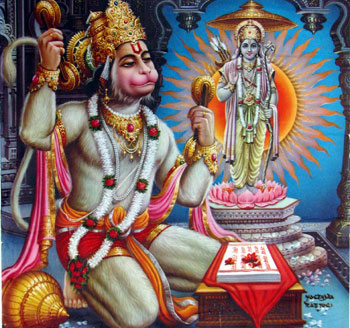 |
Hanuman said to Rama on another occasion, "Oh Lord! If I view you as my `King', I am your `servant'. If I consider myself a ‘jiva’ - an individual entity, you are my ‘deva’ – God’. If I am atma, conscience, you are Consciousness. As both of us are only One.So by embracing dasyabhakti, the path of a loyal servant's devotion, with intense steadfastness, Hanuman passed through these three stages and ultimately experienced unity with God. When he felt that he was a servant of Rama, the King, he was passing through the state of dualism. When he found himself as an individual, with Rama as his God, it expressed qualified non-dualism, and finally when he found unity with God, he experienced non dualism.
In Lanka having entered the palace of Ravana, Hanuman had to see many a woman fast asleep, as he had to identify only Mother Sita. Such was his reverence for every woman that she looked at everyone as if she were his own mother. This was the crest or crown of his character. Hanuman is the embodiment of devotion, the personification of humility and the very symbol of sincerity and obedience. All youngsters today should take him as their ideal.
Prof. Anil Kumar: Swami! Ravana was the grandson of Pulastyabrahma. He was an ardent devotee of Siva. He was a great scholar in all the scriptures and the Vedas. Above all, he was a valorous warrior and an expert in archery. Such a person was reduced to total ruin. What could be the secret behind his fall?
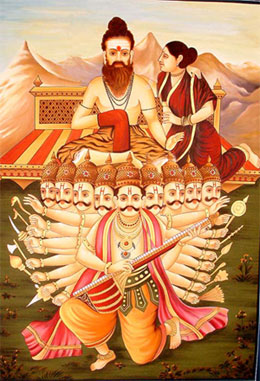 |
Bhagavan: Viewed spiritually, Ravana's destruction at Rama's hands teaches you that in spite of your physical strength, intelligence, wealth, the might of a large army, the power of your deep penance, if you become a victim of desire of a low order or lust, you will ruin yourself totally.
There is another inner significance to this event. At the gate of Vaikuntha, Heaven, were two guards by name Jaya and Vijaya. They were discourteous to two sages, Sanaka and Sananda who came to visit Lord Vishnu. They cursed the two gatemen and consequently they had to leave Vaikuntha. Then, they prayed to be pardoned and begged them to suggest a way out. As atonement, the sages counselled them to opt for three births as demons, living in utter hatred of Lord Vishnu and dying at His hands, paving thereby the way for their early return to heaven. Thus, Jaya and Vijaya were reborn as the demon brothers, Hiranyaksha and Hiranyakasipu, Sisupala and Dantavaktra, Ravana and Kumbhakarna – all these duos spent their lives in bitter enmity with Vishnu, and died at His hands; this enabled them to reach their original place in Vaikuntha.
Ravana's acts should be viewed in this context. If he entertained any bad motives in abducting Sita, how is it that he did not touch her all through the period of her stay in Lanka? Unless he abducted Sita, Rama wouldn't fight with him. So, to fight Rama in open battle was the only way for Ravana to die at His hands. The climax of the Ramayana, the victory of Rama and the death of Ravana, indicates how Ravana's heart pined for his lord, Rama.
Dear Reader, did this article inspire you in any way? Would you like more of such conversations with the Divine? Please share with us your reflections by writing to h2h@radiosai.org mentioning your name and country. Thank you for your time.





